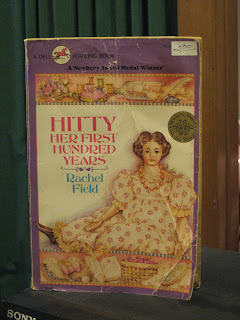
I fell in love with Hitty during one of those dreamy grammar school years when I was discovering all those wonderful classic children’s books for the first time. I believe my older sister had checked it out of the library, and I read it during one of those sessions when Hitty stayed with us. (Our normal practice was to re-read our favorites, so a rotating handful of those were always around) Whenever I re-read Hitty today, I can still feel the excitement of the first time; what in the world will happen to Hitty next? It’s not “What will Hitty do,” but rather “What will happen to Hitty,” because, you see, Hitty is a doll, a doll carved by an itinerant peddler out of his lucky piece of mountain ash for a little girl in Maine.
For a while, we kids had a rumor going that there was another book out there; Hitty: Her Second Hundred Years. Since Hitty has ended these memoirs during the dawn of the age of aviation, it seemed like a reasonable story for the 1960’s. But, alas, the book was written in 1929, so if Hitty’s second hundred years make it to print, it won’t be by Rachel Field.
Hitty is a small doll, less than six inches in height, allowing her to be tucked into a girl’s muff, be shoved into the back of a sofa, become a pincushion, and be clutched in a small hand. Her pleasant expression is painted on her face, reflecting a serene spirit and pragmatic acceptance of her lot.
Hitty is a practical being. She does not waste her energies on sentimentality or regrets. She may engage in a few moments of nostalgia, but that can be forgiven, since this is, of course, a memoir! I see her values as being those of that generation who met the Great Depression with the courage and fortitude to make it through. If Hitty were to teach a lesson, it would be to accept with equanimity and optimism the position you find yourself in. Of Hitty’s responses to a bad situation, here is one of my favorites. Hitty has fallen overboard from a burning ship just in time.
“Well,” I remember thinking as I took the plunge. “At least I shall not be burned up. Water is kinder to wood than fire and I have heard that salt is a great preservative.”
For a while, we kids had a rumor going that there was another book out there; Hitty: Her Second Hundred Years. Since Hitty has ended these memoirs during the dawn of the age of aviation, it seemed like a reasonable story for the 1960’s. But, alas, the book was written in 1929, so if Hitty’s second hundred years make it to print, it won’t be by Rachel Field.
Hitty is a small doll, less than six inches in height, allowing her to be tucked into a girl’s muff, be shoved into the back of a sofa, become a pincushion, and be clutched in a small hand. Her pleasant expression is painted on her face, reflecting a serene spirit and pragmatic acceptance of her lot.
Hitty is a practical being. She does not waste her energies on sentimentality or regrets. She may engage in a few moments of nostalgia, but that can be forgiven, since this is, of course, a memoir! I see her values as being those of that generation who met the Great Depression with the courage and fortitude to make it through. If Hitty were to teach a lesson, it would be to accept with equanimity and optimism the position you find yourself in. Of Hitty’s responses to a bad situation, here is one of my favorites. Hitty has fallen overboard from a burning ship just in time.
“Well,” I remember thinking as I took the plunge. “At least I shall not be burned up. Water is kinder to wood than fire and I have heard that salt is a great preservative.”

Hitty passes from hand to hand, experiencing a century of being owned, treasured, forgotten, worshiped, and abused by a wide assortment of individuals until she has ended up in an antique shop, “In Which I Begin My Memoirs.”
Don't think that Hitty is a dry book of moralizing. Not so! Under her cheerful and practical demeanor runs a dry wit and underspoken humor.
Hitty is a wonderful book that has taken on new life, as the original audience has grown up and started various Hitty Doll Clubs, with all the accoutrements that go along with it. I must admit that I would have pined to have my own Hitty doll as a kid, but I’m sure I would have been ultimately disappointed because it would have only been a copy of the real thing.
I picked up my copy of this book recently at a thrift store. The cover is more modern (1990) than the interior illustrations, which are original and more fascinating.
Hitty is a wonderful book that has taken on new life, as the original audience has grown up and started various Hitty Doll Clubs, with all the accoutrements that go along with it. I must admit that I would have pined to have my own Hitty doll as a kid, but I’m sure I would have been ultimately disappointed because it would have only been a copy of the real thing.
I picked up my copy of this book recently at a thrift store. The cover is more modern (1990) than the interior illustrations, which are original and more fascinating.
No comments:
Post a Comment